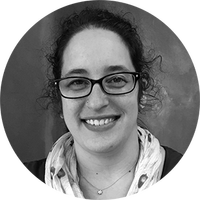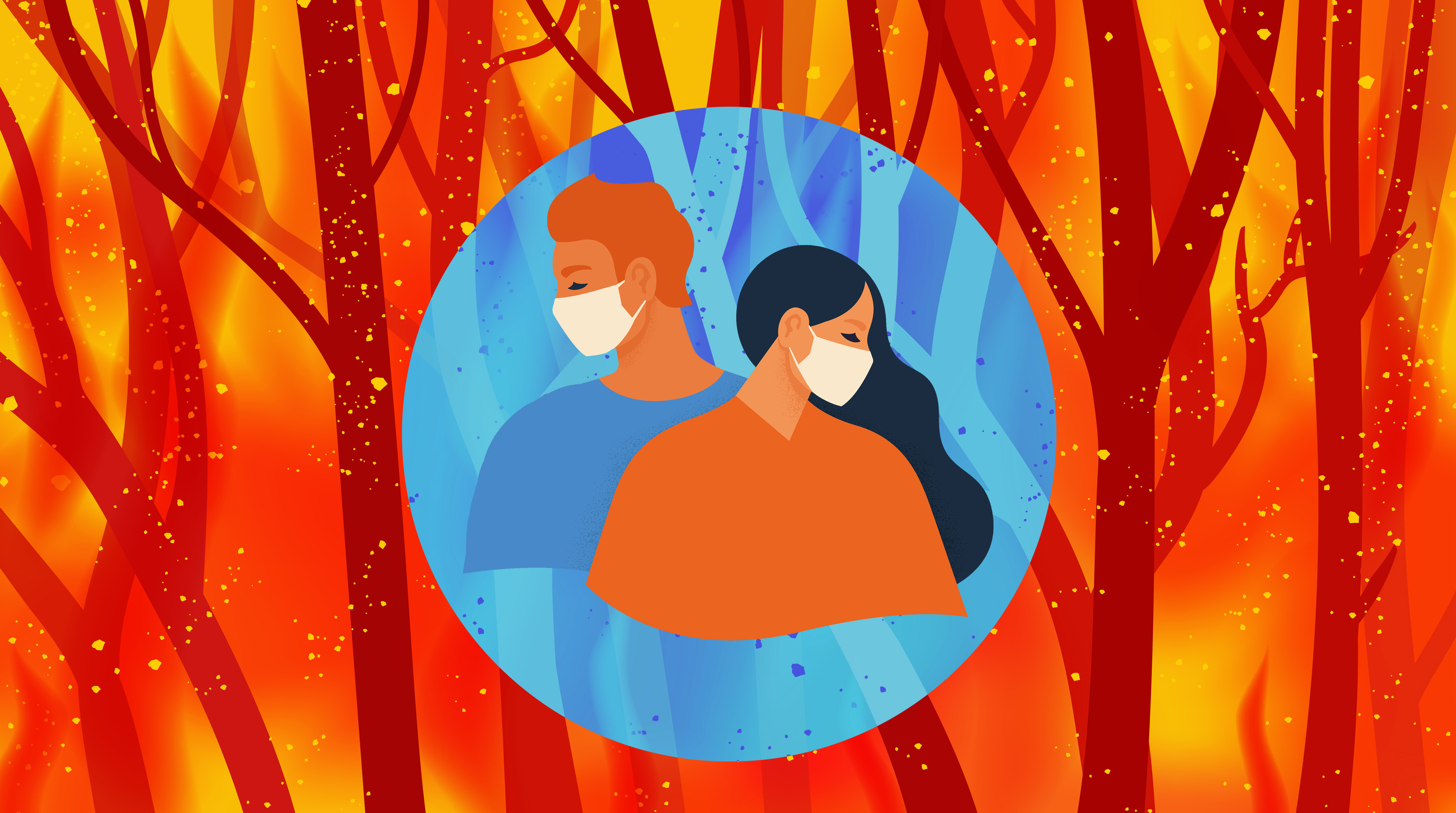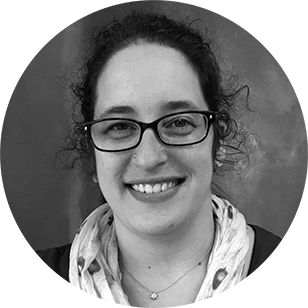How to make sense of senseless times
"Life goes on," my father said. "It has to."


A free daily email with the biggest news stories of the day – and the best features from TheWeek.com
You are now subscribed
Your newsletter sign-up was successful
In early September, I woke up to a yellow sky. We'd been enveloped in smoke and surrounded by fire in the Bay Area for the better part of a month. But this was different. Now, with a heavy veil of smoke blocking the sun, the heat-wave temperatures of the previous weeks had dropped to an autumnal chill. The sky was dark as dusk; my body had no sense of what time it was. It felt apocalyptic.
I put on my bathrobe and went downstairs, made myself a mug of tea, and sat at the dining table, staring out the window. I thought back to a conversation with my family, toward the end of 2016. We'd gathered for dinner, more somber than festive, still absorbing the results of the presidential election. My husband and I had just gotten married a few months before; the future we'd hoped and planned for was already curdling and turning dark. My parents spoke of past generations, living through the tightening grip of Nazi horror and oppression that we — their American descendants — had so far been spared. "People still got married," my father said. "They still had children. They broke bread together. Life goes on. It has to."
We're approaching the tail end of one of the most chaotic years in our country's history. We don't know how much worse it will get, or how soon, or for how long, and we can't predict what lasting effects this year's events will have. Already we've been inescapably confronted with the inhumanity and fragility of our economy, our supply chain, our health-care system. We've seen our government turn violently on civilians, invoking the language of military and might to quash protests in the streets. We've had our social bonds severed and rituals scrambled, as hugs beget infections and gatherings become spreading events.
The Week
Escape your echo chamber. Get the facts behind the news, plus analysis from multiple perspectives.

Sign up for The Week's Free Newsletters
From our morning news briefing to a weekly Good News Newsletter, get the best of The Week delivered directly to your inbox.
From our morning news briefing to a weekly Good News Newsletter, get the best of The Week delivered directly to your inbox.
And yet the sun keeps coming up each day — whether the sky is clear, or cloudy, or shrouded in smoke. I drink my tea, and I look out the window at the smoldering sky. I make a mental note to invite a friend to go hiking when the air clears. I remember there are dishes in the sink to wash. The cat wants food. It'll be bedtime soon.
There's been a lot of ink spilled about the political implications, the historical resonances, and the doom-and-gloom predictions of what's next for Americans. We're facing the end of life as many of us knew it; that's a frightening prospect, especially for those of us who have thus far been relatively cushioned by privilege.
But there are still children to raise. For the fortunate among us, there are jobs to be done and homes to be tended. We have to eat, and sleep, and go about the business of living. So how do we stay afloat, and stay human, in a time that's upending everything we took for granted — even the air we breathe?
Every person I speak to is navigating the maelstrom differently. For me, some of these grooves — the most intimate, personal ones — have already been worn. In 2019, I learned what it was like to have my life suddenly suspended: I helped care for my father through a turbulent final illness, then got sick myself with a virus that left me largely housebound for months. In the fog of grief and illness, I learned to occupy my hands and mind with cooking and sewing. I learned to take my social interactions where and when I could, and to find ways of being present even when I couldn't see people in person. I learned to absorb the insult of the sun continuing to rise every day, even though it felt as if my world had already ended.
A free daily email with the biggest news stories of the day – and the best features from TheWeek.com
Now, of course, the scale has shifted. I'm grappling not just with personal loss, but with horror upon national horror. On good days, I remind myself that we've made it this far: Four years ago, I couldn't imagine living through Day One of a Trump presidency. On bad days, I look ahead to Election Day and my calendar crumbles into a cliff. Time simply stops existing past November 3.
And yet, my imagination of life stubbornly refuses to stand still. Even as wildfire ash piles up on the new patio table in our backyard, my husband and I daydream aloud about gathering people around that table for years to come. I sew garments and imagine the places I will wear them — places that I will not actually see for a long time, if ever again.
I remind myself that there are still people being born, and dying, and marking every milestone in between. When the pandemic stopped weddings in their tracks, people began marrying over Zoom. We are still cooking meals, and washing dishes, and walking side-by-side with each other when we can.
So each morning, I wake up and look out the window. I take stock of the day's shocks and heartbreaks. I make my tea, and eat my breakfast. I get to work.
Want more essential commentary and analysis like this delivered straight to your inbox? Sign up for The Week's "Today's best articles" newsletter here.
Zoe Fenson is a freelance writer based in the San Francisco Bay Area. Her writing has appeared in Longreads, Narratively, The New Republic, and elsewhere. When she's not writing, you'll find her doing crossword puzzles in cocktail bars or playing fetch with her cat.
-
 Bad Bunny’s Super Bowl: A win for unity
Bad Bunny’s Super Bowl: A win for unityFeature The global superstar's halftime show was a celebration for everyone to enjoy
-
 Book reviews: ‘Bonfire of the Murdochs’ and ‘The Typewriter and the Guillotine’
Book reviews: ‘Bonfire of the Murdochs’ and ‘The Typewriter and the Guillotine’Feature New insights into the Murdoch family’s turmoil and a renowned journalist’s time in pre-World War II Paris
-
 Witkoff and Kushner tackle Ukraine, Iran in Geneva
Witkoff and Kushner tackle Ukraine, Iran in GenevaSpeed Read Steve Witkoff and Jared Kushner held negotiations aimed at securing a nuclear deal with Iran and an end to Russia’s war in Ukraine
-
 The billionaires’ wealth tax: a catastrophe for California?
The billionaires’ wealth tax: a catastrophe for California?Talking Point Peter Thiel and Larry Page preparing to change state residency
-
 Bari Weiss’ ‘60 Minutes’ scandal is about more than one report
Bari Weiss’ ‘60 Minutes’ scandal is about more than one reportIN THE SPOTLIGHT By blocking an approved segment on a controversial prison holding US deportees in El Salvador, the editor-in-chief of CBS News has become the main story
-
 Has Zohran Mamdani shown the Democrats how to win again?
Has Zohran Mamdani shown the Democrats how to win again?Today’s Big Question New York City mayoral election touted as victory for left-wing populists but moderate centrist wins elsewhere present more complex path for Democratic Party
-
 Millions turn out for anti-Trump ‘No Kings’ rallies
Millions turn out for anti-Trump ‘No Kings’ ralliesSpeed Read An estimated 7 million people participated, 2 million more than at the first ‘No Kings’ protest in June
-
 Ghislaine Maxwell: angling for a Trump pardon
Ghislaine Maxwell: angling for a Trump pardonTalking Point Convicted sex trafficker's testimony could shed new light on president's links to Jeffrey Epstein
-
 The last words and final moments of 40 presidents
The last words and final moments of 40 presidentsThe Explainer Some are eloquent quotes worthy of the holders of the highest office in the nation, and others... aren't
-
 The JFK files: the truth at last?
The JFK files: the truth at last?In The Spotlight More than 64,000 previously classified documents relating the 1963 assassination of John F. Kennedy have been released by the Trump administration
-
 'Seriously, not literally': how should the world take Donald Trump?
'Seriously, not literally': how should the world take Donald Trump?Today's big question White House rhetoric and reality look likely to become increasingly blurred
